Search:
Powered by
Website Baker
Grant Mulls Removal of Rosecrans during Price’s 1864 Missouri Raid |
| Posted by The Muse (themuse) on Sep 05 2014 |
Confederate Major General Sterling Price invaded Missouri with 12,000 cavalry troops on September 19, 1864. The Union commander in Missouri at the time was Major General William S. Rosecrans. The United States Army General-in-Chief at the time was Lieutenant General Ulysses S. Grant.
It is relatively well known among American Civil War enthusiasts that the relationship between Grant and Rosecrans was a rocky one. What is less well known is that Grant considered replacing Rosecrans in Missouri in the middle of Price’s Raid.
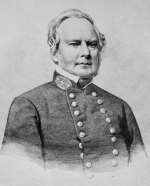
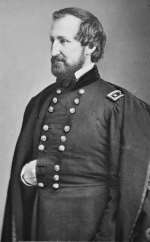
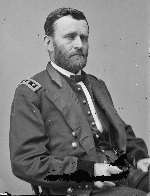
When Rosecrans received information about movements north by Sterling Price, he scrambled to marshal enough forces to defend against a large cavalry raid into Missouri. Rosecrans received authorization to raise additional volunteer regiments. He also convinced the War Department to divert 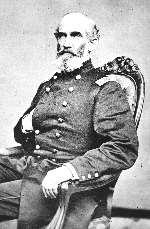 Major General A. J. Smith’s Right Wing, 16th Army Corps into Missouri. But he didn’t stop there and began taking actions which interfered with Grant’s priorities.
Major General A. J. Smith’s Right Wing, 16th Army Corps into Missouri. But he didn’t stop there and began taking actions which interfered with Grant’s priorities.
 Major General A. J. Smith’s Right Wing, 16th Army Corps into Missouri. But he didn’t stop there and began taking actions which interfered with Grant’s priorities.
Major General A. J. Smith’s Right Wing, 16th Army Corps into Missouri. But he didn’t stop there and began taking actions which interfered with Grant’s priorities.In the summer of 1864, the top priorities of the United States Army were the Confederate armies of Generals Robert E. Lee and John B. Hood. By late summer, Grant had Lee bottled up in Petersburg, Virginia and Major General William T. Sherman was in the middle of the Atlanta Campaign against Hood. Grant was constantly trying to extract regiments from the west to reinforce Sherman in Georgia.
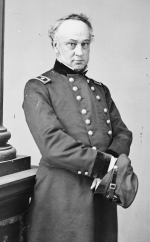 On September 29, 1864, Major General Henry W. Halleck, the US Army Chief-of-Staff, sent a telegram to Grant to advise him of Rosecrans’ interference.
On September 29, 1864, Major General Henry W. Halleck, the US Army Chief-of-Staff, sent a telegram to Grant to advise him of Rosecrans’ interference.No effort has been omitted to push troops forward to Nashville, subject to General Sherman's orders. Every new regiment and recruit in the Western States were assigned to his army. I have just learned that General Rosecrans has ordered to Saint Louis a veteran Illinois regiment belonging to General Sherman and also a Wisconsin [Minnesota] regiment en route to Nashville. He had no authority for this, but, on the contrary, I refused to permit him to stop troops belonging to General Sherman. I have telegraphed him to forward them on immediately, but I presume he will, as usual, disobey orders. [i]
Grant replied to Halleck that same night.
If Rosecrans does not send forward the regiments belonging to Sherman as ordered arrest him, by my order, unless the President will authorize his being relieved from command altogether. [ii]
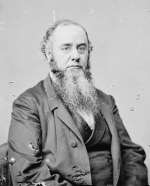 Rosecrans did return the regiments and was not arrested. But a dispatch sent by Grant to Secretary of War Edwin M. Stanton on October 11, indicates that Rosecrans had stayed in his thoughts.
Rosecrans did return the regiments and was not arrested. But a dispatch sent by Grant to Secretary of War Edwin M. Stanton on October 11, indicates that Rosecrans had stayed in his thoughts.On reflection I do not know but that a proper regard for the present and future interests of the service demands the removal of Rosecrans and the appointment of a subordinate general in his place. In conversation I said that I doubted the propriety of making any change during present complications, but present movements of Hood's army, especially if he should go on to the Mississippi River, may make it necessary to have a commander in Missouri who will co-operate. The best general now in Missouri to take that command would be General J. J. Reynolds, if he is there; if not, then [Joseph A.] Mower would come next. Probably more activity could be insured by sending Sheridan to Missouri, place Meade where Sheridan is, and put Hancock in command of the Army of the Potomac. I send this more to get your views before anything positive is done than to ask the change at once. It ought to be made, however, as soon as what is thought best can be agreed upon. [iii]
Apparently, Stanton had no issues with the removal of Rosecrans. He replied to Grant later that afternoon.
Whatever your judgment dictates as best in view of the western operations now developing, will have my cordial acquiescence. Sheridan is no doubt the best man, but his presence here will spare to you thousands of troops that would be required by any other commander. Have you considered what, if anything, would be accomplished by sending Hooker to the field as division commander, including Missouri, and, if you choose, Kansas and Arkansas, or either of them. I have no wish on this point, but only suggest it for consideration, if you have not already thought of it. [iv]
The very next day, Grant sent a reply to Stanton.
I agree with you that Sheridan cannot well be replaced in his present position. I have also considered well the matter of sending Hooker to Missouri, and on mature reflection do not believe he will do. We want there a man who will push the enemy with vigor without waiting to get up supplies from a given base. There are no better men to command a division in such a pursuit of an enemy than Smith and Mower, who are already there. To give a proper head is now the question. After thinking over all the generals who can possibly be spared, I have made up my mind that Crook is the man to send. I would recommend General Logan for Crook's place. He is an active, fighting general, and under Sheridan will make a first-class commander for that department. [v]
But the removal of Rosecrans faded away until the evening of October 20 when Grant telegraphed Halleck for an update about what was happening in Missouri.
Has Rosecrans yet come upon Price? If he has not he should be removed at once. Price is in a country where he supports his army without difficulty, and there is no reason why our forces should not move without any delay. Of all the generals whose names have been mentioned in connection with the successorship and are available I prefer Logan. Anybody, however, will be better than Rosecrans. [vi]
Halleck replied to Grant on October 21.
Nothing satisfactory from Missouri. I can form no clear idea of the condition of affairs from reports received here. General [Samuel R.] Curtis seems to be fighting near Independence, but I hear nothing of Rosecrans, A. J. Smith's or Mower's divisions. No action yet as to change of commanders. [vii]
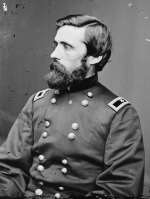 Well, Sterling Price was finally driven out of Missouri by the end of October in 1864. At first, Rosecrans did not send A. J. Smith’s two infantry divisions immediately east. He ordered them to march across by land operating against guerrillas on his way back to St. Louis. Grant’s orders even directed Brigadier General John A. Rawlins, his Chief-of-Staff, to travel to Missouri to make sure these orders were carried out promptly and effectively. [viii]
Well, Sterling Price was finally driven out of Missouri by the end of October in 1864. At first, Rosecrans did not send A. J. Smith’s two infantry divisions immediately east. He ordered them to march across by land operating against guerrillas on his way back to St. Louis. Grant’s orders even directed Brigadier General John A. Rawlins, his Chief-of-Staff, to travel to Missouri to make sure these orders were carried out promptly and effectively. [viii]Just before noon on November 1, US Army Chief-of-Staff Henry W. Halleck followed up Grant’s order with a telegram directly to Rosecrans. Get A. J. Smith and the Right Wing of the 16th Army Corps back to Tennessee as quickly as possible.
Dispatches just received from General Thomas render it imperative that re-enforcements be sent to him with all possible dispatch. A. J. Smith should move by forced marches; his men can rest on the steamers. There should be no delay for payments, as Hood is crossing the Tennessee. Thomas may want the re-enforcements landed at Savannah or Clifton, or sent direct to Nashville. Consult him by telegraph when the troops reach Saint Louis. General Grant directs that all available troops in Saint Louis and vicinity be sent immediately to General Thomas. [ix]
Rosecrans modified his marching orders to Smith to comply with Halleck’s orders. Rosecrans replied to Halleck later that afternoon. You might infer from the tone of the dispatch that Rosecrans thought the War Department was looking a little too closely over his shoulder. [x]
Dispatch of 11.30 a.m. received. General Smith's command is marching as rapidly as possible toward the Missouri River. If they are to take their batteries, ammunition, and regimental trains they can reach the Mississippi more rapidly by marching than by the river, which is so low that the lightest draught boats can only run in the daytime, and, when loaded, stick so frequently on the shoals that it took seven days for Mower's troops to move from Saint Louis to Jefferson City, as stated in a former dispatch. Arrangements have been made to meet the division with rations at the Missouri River, and for transports, with supplies, to meet them at the Mississippi. These arrangements will, in my judgment, carry the command to General Thomas in a fighting condition sooner than any other. If, however, the General-in-Chief thinks best to have them sent without artillery, ammunition, and regimental trains, or in driblets, they could be forwarded, possibly, five days sooner. He must decide at once in order to carry this out. There are no available troops at Saint Louis. [xi]
Halleck fired back at Rosecrans the next morning. You can almost feel the frustration in Halleck’s reply. [xii]
I cannot designate the route for Smith's march. All I can say is, send him by the shortest in time. It is exceedingly important that he should re-enforce General Thomas as speedily as possible. The first that reach the transports should go at once to Paducah and await their trains there. [xiii]
Brigadier General Rawlins arrived in St. Louis in the morning on November 3. Rosecrans returned to St. Louis that evening. After conferring with Rosecrans, Rawlins sent a dispatch to Grant assuring him that everything was being done to get A. J. Smith’s command to Tennessee in a timely manner. [xiv]
Grant did have the last word with a paragraph in his official report about the operations of the US Army from March 1864 to May 1865.
About the last of August, it being reported that the rebel General Price, with a force of about 10,000 men, had reached Jacksonport, on his way to invade Missouri, General A. J. Smith's command, then en route from Memphis to join Sherman, was ordered to Missouri. A cavalry force was also, at the same time, sent from Memphis, under command of Colonel Winslow. This made General Rosecrans' forces superior to those of Price, and no doubt was entertained he would be able to check Price and drive him back, while the forces under General Steele, in Arkansas, would cut off his retreat … The impunity with which Price was enabled to roam over the State of Missouri for a long time, and the incalculable mischief done by him, show to how little purpose a superior force may be used. There is no reason why General Rosecrans should not have concentrated his forces, and beaten and driven Price before the latter reached Pilot Knob. [xv]
[i] OR Series 1, Volume 41, Part 3, 468.
[ii] OR Series 1, Volume 41, Part 3, 469.
[iii] OR Series 1, Volume 41, Part 3, 773.
[iv] OR Series 1, Volume 41, Part 3, 774.
[v] OR Series 1, Volume 41, Part 3, 801.
[vi] OR Series 1, Volume 41, Part 4, 126.
[vii] OR Series 1, Volume 41, Part 4, 153.
[viii] OR Series 1, Volume 41, Part 4, 305-307.
[ix] OR Series 1, Volume 41, Part 4, 390.
[x] OR Series 1, Volume 41, Part 4, 390-319.
[xi] OR Series 1, Volume 41, Part 4, 390.
[xii] OR Series 1, Volume 41, Part 4, 390-319.
[xiii] OR Series 1, Volume 41, Part 4, 399.
[xiv] OR Series 1, Volume 41, Part 4, 429-430.
[xv] OR Series 1, Volume 34, Part 1, 33-34.
Last changed: Sep 05 2014 at 1:50 PM
Back